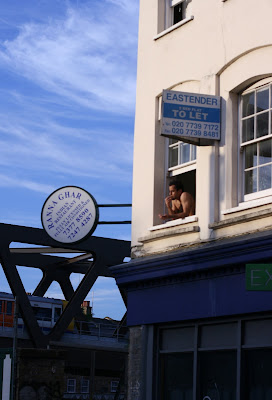Flower Girl
 The market arrives, as it does every Saturday morning during summer, right next to our hotel filling the street with vegetables, cheeses, clothes, zucchini flowers, bracelets, bathing suits, underwear (me, loudly: "Madeleine, should we get you some pants?"), olives+an enormous roast pig sold either by weight or in buns as sandwiches which brings back memories of Lago di Albano where the Pope has his summer palace and Sonnet, Bru and I ate the most wonderful pork sandwiches and watched Roma football on a black and white television. This some many years ago now. From the stalls we head to the beach while Madeleine confined to a tee-shirt and canopy due to her delicate red skin. Our lobster is a trooper. Eitan befriends a group of seven or eight older boys who play sand football. None speak english so they point and jab at each other. Eitan's need for footie overcomes his reluctance; he has been watching them the past two days. It remains unbearably hot though I am not complaining - jogging nearly wipes me out. A summer storm blanks the beach and brings down the temps momentarily. Sonnet, Madeleine and I play "Crazy Eights" at the lido watching the storm pass over. Later, we send the Shakespeares down the block, by themselves, to get gelato. All this before lunchtime.
The market arrives, as it does every Saturday morning during summer, right next to our hotel filling the street with vegetables, cheeses, clothes, zucchini flowers, bracelets, bathing suits, underwear (me, loudly: "Madeleine, should we get you some pants?"), olives+an enormous roast pig sold either by weight or in buns as sandwiches which brings back memories of Lago di Albano where the Pope has his summer palace and Sonnet, Bru and I ate the most wonderful pork sandwiches and watched Roma football on a black and white television. This some many years ago now. From the stalls we head to the beach while Madeleine confined to a tee-shirt and canopy due to her delicate red skin. Our lobster is a trooper. Eitan befriends a group of seven or eight older boys who play sand football. None speak english so they point and jab at each other. Eitan's need for footie overcomes his reluctance; he has been watching them the past two days. It remains unbearably hot though I am not complaining - jogging nearly wipes me out. A summer storm blanks the beach and brings down the temps momentarily. Sonnet, Madeleine and I play "Crazy Eights" at the lido watching the storm pass over. Later, we send the Shakespeares down the block, by themselves, to get gelato. All this before lunchtime.
























